Related Research Articles

"Woodstock" is a song written by Canadian-American singer-songwriter Joni Mitchell. At least four notable versions of the song were released in the same year, 1970. Mitchell's own version was first performed live in 1969 and appeared in April 1970 on her album Ladies of the Canyon and as the B-side to her single "Big Yellow Taxi". This publication was preceded by Crosby, Stills, Nash & Young's cover version, which appeared on their March 1970 album Déjà Vu and became a staple of classic rock radio and the best-known version in the United States. A third version, by the British band Matthews Southern Comfort became the best known version in the United Kingdom, and was the highest charting version of the song, reaching the top of the UK singles chart in 1970. A fourth version by studio project The Assembled Multitude also became a chart hit.
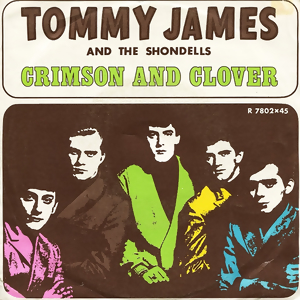
"Crimson and Clover" is a 1968 song by American rock band Tommy James and the Shondells. Written by the duo of Tommy James and drummer Peter Lucia Jr., it was intended as a change in direction of the group's sound and composition.
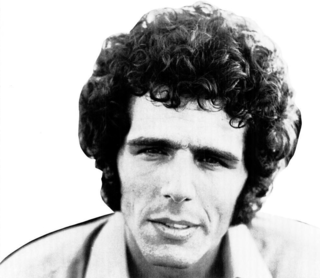
Robert Bloom was an American singer-songwriter. He is known best for the upbeat 1970 hit, "Montego Bay", which was co-written with and produced by Jeff Barry.

"Proud Mary" is a song by American rock band Creedence Clearwater Revival, written by vocalist and lead guitarist John Fogerty. It was released as a single in January 1969 by Fantasy Records and on the band's second studio album, Bayou Country. The song became a major hit in the United States, peaking at No. 2 on the Billboard Hot 100 in March 1969, the first of five singles to peak at No. 2 for the group.
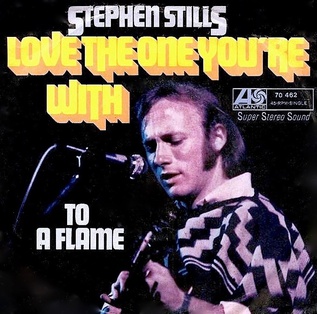
"Love the One You're With" is a song by American folk rock musician Stephen Stills. It was released as the lead single from his debut self-titled studio album in November 1970. The song, inspired by a remark Stills heard from musician Billy Preston, became his biggest hit single, peaking at No. 14 on the Billboard Hot 100 in early 1971. David Crosby and Graham Nash, Stills' fellow members of Crosby, Stills & Nash, provide background vocals on the song. Also providing the backups are Rita Coolidge, her sister Priscilla Jones, and John Sebastian. They all sing the "Do Dos" that come before the instrumental portion and the Outro. The song was also recorded by the Isley Brothers, The Meters, Bucks Fizz, Luther Vandross, Bob Seger and Richard Clapton, among others.

"Montego Bay" is a song co-written and performed by Bobby Bloom about the city in Jamaica of the same name. The song was a top ten hit for Bloom in the Fall of 1970 on both sides of the Atlantic. It reached No. 3 on the UK Singles Chart, No. 5 on the Canadian RPM 100 Singles Chart, No. 7 on the Australian Go-Set Singles Chart and No. 8 on the US Billboard Hot 100. The song was co-written and produced by Jeff Barry. In the master tape of the song, Bloom breaks into a chorus of "Oh, What a Beautiful Mornin'" at the end of the recording. The song features a whistler, as well as Jamaican instruments in a calypso style.
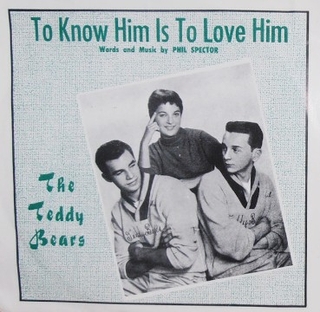
"To Know Him Is to Love Him" is a song written by Phil Spector, inspired by words on his father's tombstone, "To Know Him Was to Love Him." It was first recorded by the only vocal group of which he was a member, the Teddy Bears. Their recording spent three weeks at No. 1 on the Billboard Hot 100 chart in 1958, while reaching No. 2 on the UK's New Musical Express chart. Peter & Gordon and Bobby Vinton later had hits with the song, with its title and lyrics changed to "To Know You Is to Love You". In 1987, the song was resurrected by Dolly Parton, Linda Ronstadt, and Emmylou Harris, whose Trio recording topped the U.S. country singles chart.
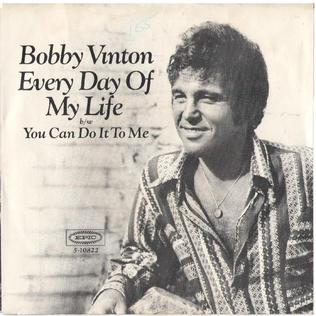
"Ev'ry Day of My Life" is a popular song written in 1954 by Al Jacobs and Jimmie Crane.
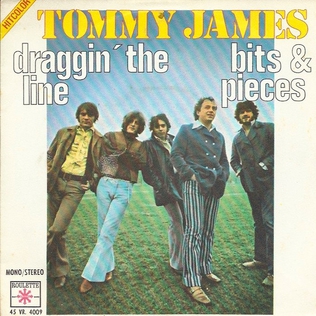
"Draggin' the Line" is a hit song by American rock musician Tommy James, who went solo after the Shondells disbanded in 1970. It was first released as the B side of "Church Street Soul Revival" in 1970. The song was judged to have some hit potential so they went back in the studio and added horns to the master and re-released it as an A side single in 1971. It was included on his second album, Christian of the World in 1971 on the Roulette Records label. The song was James' biggest hit as a solo artist selling more than a million copies, and appears as the fifth track on James' 1991 retrospective album The Solo Years (1970-81) released by Rhino.

"Watching Scotty Grow" is a song written by country music singer-songwriter Mac Davis and recorded by Bobby Goldsboro in 1970 on his album, We Gotta Start Lovin. Davis recorded his version on his 1971 album, I Believe in Music.
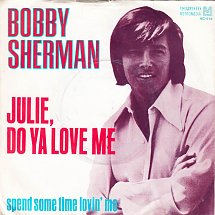
"Julie, Do Ya Love Me" is a song written by Tom Bahler, which was a hit recording in 1970 for Bobby Sherman and later the same year for White Plains.
"1900 Yesterday" is a song written by John Cameron and Lee Simmons. The song was originally released by Betty Everett in 1969 on the album There'll Come a Time.
"Stay Awhile" is a song written by Ken Tobias, and was an international hit single for the Bells in 1971.
John Linde is an American music producer. Musically, he has been involved in genres which include, doo-wop, r&b, soul, pop, and heavy rock. As a producer, his work includes the albums The Beat Goes On for Vanilla Fudge, Sir Lord Baltimore by Sir Lord Baltimore, and A Mouth in The Clouds for The Group Image. He produced the singles, "Where Are We Going" by Bobby Bloom, "A Touch of Baby" for The Tymes, "The Letter" for The Outrage and others. He has also composed hits for Peter Antell, The Percells and Bobby Bloom.
"Heavy Makes You Happy" was a hit song for Bobby Bloom in 1971. The song was written by Jeff Barry and Bloom, while Barry produced it. It was also a hit for The Staple Singers. Other artists who have recorded it include, The Alabama State Troupers, Gladys Knight & the Pips, Claudja Barry, The Solution and Keb' Mo'.
"Make Me Happy" is a song by Bobby Bloom, released on MGM in 1970. It was written by Bloom and Jeff Barry. It became a hit for Bloom in early 1971.
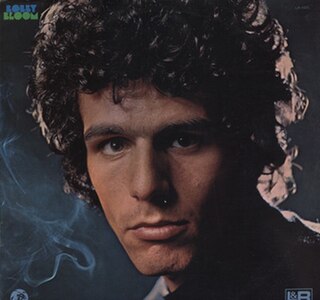
The Bobby Bloom Album was the first album for composer, producer and singer Bobby Bloom. It charted in late 1970 through to early 1971. It contained his hits "Montego Bay" and "Heavy Makes You Happy".
Robin Wilson is a singer and actress active in the late 1960s and mid 1970s. She had a hit in 1968 with "Where Are They Now". In the 1970s she had a recurring role in the television series Hot l Baltimore.
"Sha La La Boom Boom" was a single for Bobby Bloom in 1972. Co-written by Bloom with Jeff Barry, it became a hit and reached the Cash Box, Billboard and Record World charts early the following year. It was a new attempt of an earlier song.
"We're All Goin' Home" was a 1971 single for American singer Bobby Bloom. It became a hit for him registering in the Billboard and Cash Box charts.
References
- ↑ Cash Box, December 19, 1970 - Page 82 Roulette Gets Bloom Masters
- ↑ Cash Box, January 16, 1971 - Page 10 Roulette Gears For Major Qtr.
- ↑ Discogs - Bobby Bloom – Where Are We Going / Of Yesterday, Label: RCA – ROC-11002
- ↑ Cash Box, December 19, 1970 - Page 20 cashbox/ singles reviews, Picks of the Week, BOBBY BLOOM (Roulette 7095)
- ↑ Billboard< December 19, 1970 - Page 62 SPECCIAL MERIT SPOTLIGHT, Spotlighting new singles deserving special attention of programmers and dealers., Bobby Bloom
- ↑ Cash Box, December 19, 1970 - Page 24 New Additions To Radio Playlists, Secondary, WPOP-Hartford, Conn.
- ↑ Cash Box, January 16, 1971 - Page 12 Cash Box Radio Active, 12 Where Are You Going -Bobby Bloom -Roulette 28% 28%
- ↑ Cash Box, January 23, 1971 - Page 17 Playlists - Primary Markets, Top 40 stations added to their "Playlists" last week., KJR-Seattle
- ↑ Cash Box, December 19, 1970 - Page 81 Cash Box LOOKING AHEAD
- ↑ Cash Box, December 26, 1970 - Page 86 Cash Box LOOKING AHEAD, 25 WHERE ARE WE GOING
- ↑ Cash Box, January 23, 1971 - Page 12 Cash Box Looking Ahead, 5 WHERE ARE WE GOING
- ↑ Cash Box, January 30, 1971 - Page 4 Cash Box Top 100, January 30, 1971, 97, _, _
- ↑ Billboard, January 2, 1971 - Page 31 Bubbling Under The HOT 100 115.
- ↑ Billboard, January 9, 1971 - Page 52 Billboard HOT 100 For Week Ending JANUARY 9, 1971, THIS WEEK 100, LAST WEEK _, Weeks On Chart 1
- ↑ MusicVF.com - Bobby Bloom Top Songs , Top Songs / Chart Singles Discography 1971, 3. 01/1971 Where Are We Going by Bobby Bloom
- ↑ Billboard, January 30, 1971 - Page 58 Billboard Hot 100 Far Week Ending Jan. 30, 1971, THIS WEEK 84, LAST WEEK 85, Weeks On Chart 4
- ↑ Billboard, February 6, 1971 - Page 76 Billboard Hot 100 Far Week Ending Feb. 6, 1971